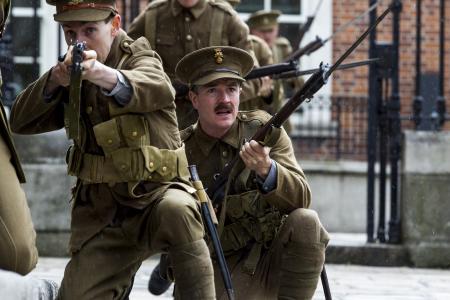I was rather lukewarm about RTÉ’s new series Rebellion after the first episode, but hoped it would improve. After two more episodes I’m disappointed.
Yes, it’s interesting and holds the attention but I often find myself getting annoyed with it, whether for the stilted dialogue, the sluggish pace or the gratuitous sex and crude language that rules it out for family viewing.
There has been however some noteworthy religious content. In one scene, in the second episode, a priest heard Confessions in the GPO and shortly after led the Volunteers in the Rosary. This was probably true to history, but it did raise issues of approval for warfare. The priest was just there to pass on the archbishop’s message to stop the violence and wasn’t in any way pushing it, just obliging Pearse who requested this ministry.
Last Sunday night’s third episode was less favourable to religion. Several characters made snide remarks about the Church, while Barry McGovern did a predictable turn as that most familiar of stereotypes, the nasty bishop (I’m not saying there aren’t any!). On the other hand, one of the nurses said she felt called by God to look after the wounded, while another was critical of the treatment of Catholics in the North.
One thing I did like about the latest episode was the way it showed some characters having second thoughts about their roles – Arthur (Barry Ward), in a firing squad, couldn’t bring himself to shoot a civilian and contemplates desertion, Frances (Ruth Bradley) the Pearse acolyte, gets upset after shooting a young British soldier (and finally gets a chance to be more than a cardboard character) and Elizabeth (Charlie Murphy) seems to have given herself totally over to nursing having originally been part of the attack on Dublin Castle.
The series was discussed on Liveline (RTÉ Radio 1) last Thursday. A very articulate and moderate history teacher complained about the bad language and sex scenes as otherwise she could have used the programme for her history classes. Other callers agreed with her, but guest presenter Philip Boucher Hayes, who thought the show was “absolutely brilliant”, wasn’t having any of it.
I thought he was particularly patronising and downright silly, when, in response to a caller objecting to the sex scenes, he pointed out that people did have sex in 1916. Duh! I normally like his style, especially his work on Drivetime (RTÉ Radio 1), and he was back on form when the programme moved on to a challenging discussion of the morality of the 1916 Rising, with Fr Seamus Murphy developing some points he made in these pages a few weeks ago.
Meanwhile, back to the present day, last Sunday night’s Meaning of Life with Gay Byrne (RTÉ One) featured Anna May McHugh, well known for her work with the National Ploughing Championships, in recent years as managing director. She came across as a cheerful, enthusiastic person of faith and there was appealing warmth about the whole interview.
She had “lovely memories” of her rural upbringing, and the Rosary was part of that, a practice she carries with her still. There was an admirable generosity in her attitudes to others – she spoke of the “good people” around her in her work and her late husband John’s “lovely temperament”. Despite his death she still felt a strong companionship with him and expected to meet him again in Heaven.
Prayer, including the Angelus, was and still is important to her, she serves on her diocesan finance committee, travels the world for the National Ploughing Association, loves gardening as a hobby and still doesn’t take an afternoon nap!
She was sad about the scandals in the Church, but felt in situations like that you had to practice your faith all the stronger. For her, the meaning of life was about doing good, living a good fulfilled life, helping others along the way. Answering Gay Byrne’s usual final question she said her words to God at the end of her life would be: “Thank you God for loving me.”
Finally, hats off to Newstalk for their regular Gaeilge Gasta slots presented by Donal O Donnabháin. These are short spoken items in Irish about cultural, historical or religious figures and are broadcast from time to time between programmes. Modest, largely under the radar, and all the better for it.


 Brendan O’Regan
Brendan O’Regan
